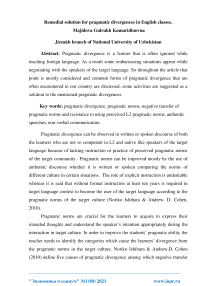Remedial solution for pragmatic divergences in English classes
Автор: Majidova G.K.
Журнал: Экономика и социум @ekonomika-socium
Рубрика: Основной раздел
Статья в выпуске: 1-1 (80), 2021 года.
Бесплатный доступ
Pragmatic divergence is a feature that is often ignored while teaching foreign language. As a result some embarrassing situations appear while negotiating with the speakers of the target language. So throughout the article that point is mostly considered and common forms of pragmatic divergence that are often encountered in our country are discussed, some activities are suggested as a solution to the mentioned pragmatic divergences.
Pragmatic divergence, pragmatic norms, negative transfer of pragmatic norms and resistance to using perceived l2 pragmatic norms, authentic speeches, nonverbal communication
Короткий адрес: https://sciup.org/140258277
IDR: 140258277 | УДК: 004.02:004.5:004.9
Текст научной статьи Remedial solution for pragmatic divergences in English classes
As our country is in the outer circle of the Word Englishes in term of using the language in communication or on any other purposes we are a bit unfamiliar with the culture or perceived pragmatic norms of the English speaking countries. Another reason of the pragmatic divergence of my learners is the lack of the topics in the syllabus of secondary schools to inform them the pragmatic norms of the target culture. Moreover, in most cases even my students acquire some perceived norms they are unwilling to follow them. The reasons pointed out affect my students to become native like pragmatic language users.
There are suggested some tasks to be used in English classes as solution to the problems related to the problems related to those divergences.
Activity 1.
Objectives:
-
1. Students will be able to be aware of some pragmatic norms to apply in their communication when they do not understand something or ask someone to repeat in target language culture.
Duration: 20 minutes.
Material: Task sheet, speakers to play the tape script.
Proficiency level of the students : Pre-intermediate.
-
1. Students are asked to work individually and write how to ask somebody to repeat something which they did not hear or understand in target culture.
-
2. Teacher plays the tape script in which there are given three or four authentic speeches according to the given situation.
-
3. Students are asked to compare their writing with the scripts played and correct their mistakes.
Activity 2.
Objective:
-
1. Students will be able to raise their awareness of the L2 pragmatic norms. Duration: 30 minutes.
Material: Task sheets.
Proficiency level of the students : Intermediate.
-
1. Teacher asks the students to work individually and write how to behave or what to tell in the given situation.
-
2. Students write their reaction to the given situations based on their existing knowledge.
-
3. Then the teacher asks the students to change their writing with each other and gives them some possible options to show the acceptable manners in the target culture according to the given situations.
-
4. When the students have exchanged their writing with each other they check their peers’ works using the given options.
-
5. Then each student is given their work and asked to conclude from their mistakes.
-
a) You were going to get acquainted with a British man or woman what would you say first as an ice breaker?
-
b) You are having dinner with a friends’ family in Britain what do you think is common to say over dinner?
-
c) Your colleague has just bought a new car and you want to know its price what would you say?
-
d) What would you say if someone sat on your seat in a train which you reserved earlier?
Activity 3.
Activity 2.
Objective:
-
1. Students will be able to choose appropriate pragmatic norms in target society.
Duration: 40 minutes
Material: computer, video projector
Proficiency level of the students : Intermediate.
-
1. Teacher asks the students to watch a short video which presents the English manners of being host/hostess and a guest.
-
2. Teacher divides the class into groups with 4 students in each then asks the groups to perform a role play that two of the students from each group will be host/hosts and two of others will be guests in order to present how they behave appropriately when they become a host/hostess and a guest.
-
3. When the groups have finished their performances the teacher asks the students to tell if they have observed resistance to using the perceived L2 pragmatic norms during the performances and in which group’s performance they have observed that category of divergence.
-
4. The groups are asked to tell about their choice why they have chosen their own pragmatic norms and why they have chosen target language pragmatic norms in their performances
Список литературы Remedial solution for pragmatic divergences in English classes
- Noriko Ishihara & Andrew. D. Cohen. 2010. Teaching and learning pragmatics. Longman Applied linguistics


